#trust science
Explore tagged Tumblr posts
Text
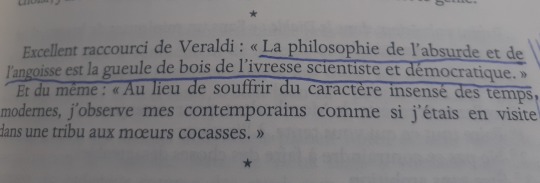
6 notes
·
View notes
Text
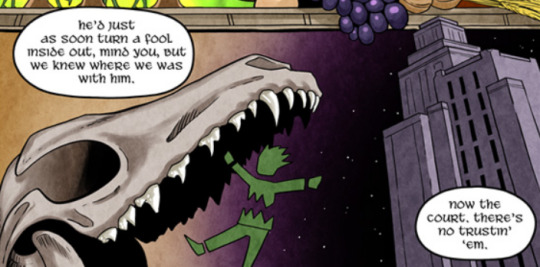
Pick the devil you know or the devil you don’t.
2 notes
·
View notes
Text
Being able to read journal articles critically is also such an important skill. I’ve been reading journal articles since late high school, but it’s only been in grad school that I’ve learned how to approach them critically. Fortunately there are a few questions you can ask about any study that will help you decide how much you trust the results even if you know nothing of the field.
What journal was the article published in? Some journals are far more reputable than others. Usually a quick Google search can inform you of if a journal is considered reputable.
Do the authors list any conflicts of interest? Conflicts of interest aren’t an immediate red flag, but if the author has a strong incentive to only publish certain results then I’ll definitely be taking a second or third look at the study.
Who funded the study? If Coca Cola funded a study that says drinking one soda a day is beneficial to your energy levels, I’m not trusting that implicitly.
Is it peer reviewed? Peer review can fail, but this is the quickest test for if a study is good or not.
What are the limitations of the study? This plays into the assumptions the author made. Were the experiments only done on white men (often the first standard in medical research though it’s getting better)?
Similarly do the authors list their limitations? The best articles will have a short section on limitations or a paragraph in the discussion about limitations. I am always slightly wary when no limitations are listed.
What is the sample size in the study? This number will usually be found in methods. The bigger the number, the better. However, there are a lot of standards for what the minimum sample size should be. In small animal research, you’re usually looking at a few dozen mice or rats. In larger animal research, you may be looking at less than ten animals (pigs, horses, cows). In human trials (also known as clinical research), it tends to be dependent on what the study is on. Knee replacements probably 15 people or so. Spinal cord trauma would be more like 5 people. (Social science will also have different minimum sample sizes but I’m not familiar enough to give estimates. In general subjective surveys require a lot of people. More objective testing done by researchers will have less people involved)
How many citations does the study have? This one can be a little more hit or miss. An article published a year or two ago may be great and have no citations. While an article published fifty years ago may have a hundred citations but have incorrect information (in this case it’s usually that methods have improved and new information was discovered instead of poor research quality). Niche topics may also be hardly cited despite being good articles.
There are other questions you can ask like “Can I follow the methods?” “Does the interpretation of their results logically follow from their results?”Etc. but those tend to be harder the less familiar you are with a field. And if you’re reading about a study in a news article like CNN, Apple News, etc. there are different tricks to determining how much you trust them (I tend to look for hyperbole and rhetorical devices. One time I found a news article saying physicists had figured out faster than light travel. They were referencing a theoretical mathematics paper that stated using several assumptions hyperluminal travel is mathematically possible)
What I learn from Science & Technology Studies is that you shouldn't blindly trust science because there's a fair amount of fuckery (mostly unintentional but sometimes not) going on in the background, but you also shouldn't *not* trust science in the way that most people who don't trust science don't trust science.
Anyways, hope that helps!
4K notes
·
View notes
Text

Please continue #stayingsafe as we’re n the midst of a very bad #CovidSummerSurge2023.
This powerful image is courtesy of #CovidDataReport out of #Philadelphia. He does an amazingly intelligent job of presenting real science, honest facts minus any political or financially driven governmental nonsense. No time for ignorance, #CovidDeniers or #Covidminimalists. His channel on You Tube is the real deal with no BS.
Check out his excellent channel at:
youtube
#covid19#covid pandemic#ongoing pandemic#covid isnt over#mask up#Covid Data Report#Trust Science#Summer COVID Surge 2023#the pandemic is not over#No Gaslighting#Youtube
1 note
·
View note
Text

It was never about your safety. It was always about control.
“Sacrifice freedom for safety and you will gain neither.” Ben Franklin
Why doesnt DC want kids taught unfiltered history? It’s easier to mislead the ignorant sheep, and it’s easier to take away what you don’t know is yours.
#truth#common sense#msm is the enemy#globalist playbook#big pharma#vaccine#trust the science#it’s about control
599 notes
·
View notes
Text

FIAT LUX



from my comic,THE SOLAR SYSTEM
#illustration#comics#queer comics#shortbox#shortbox comics fair#scifi#science fiction#the solar system#queer#trans#trans man#butch#@ the person who asked me about your reread pls lmk if you got my reply... i don't trust tumblr not to eat my asks!#he/him
250 notes
·
View notes
Text
Trust real doctors...like your own.
Anyone on a website is saying what they're saying.... for MONEY!

86 notes
·
View notes
Text
Graphic designer will Graham: I drag my cursor to the font selection box. After careful deliberation I choose comic sans. This will inflame the Chesapeake Hacker’s sophisticated sensibilities and provoke an attack.This is my graphic design. This is my passion.
#jack Crawford: this case has got me stumped let me ask my good friend the trusted computer science professor Hackibal Lecter#hannibal#nbc hannibal#hannibal shitpost#hannigram#au 🐎
912 notes
·
View notes
Text
LIES, LIES, LIES ENDLESS LIES… TIME TO WAKE UP HUMANITY
👩🏼🔬🤥👨🏻🔬
#safe and effective#warning#be ware#knowledge#know your enemy#don’t trust the science trust your intuition#trust your immune system#trust god#truth is powerful#justice is coming#corruption#greed#depopulation agenda#mind control#crimes against humanity#these people are evil#speaktruth#fight for justice#standup#speak up#truth#please share#wwg1wga
442 notes
·
View notes
Note
IDK of you're bogged down with requests, but I'd love to see LoA Frost in your style.
(Also something about the way you draw legs and thighs is just so incredibly satisfying. You're inspiring me to practice anatomy more.)
I haven’t drawn Frosty enough it’s actually criminal

I love the silly little cat man who is not at all little and is actually canonically 6 foot something

Also thank you so much! I love drawing legs they are one of my favourite features to draw. I’m so happy I could be inspiring I’m very honoured :’)
#legends of avantris#legends of avantris fanart#once upon a witchlight#ouaw fanart#morning frost#morning frost ouaw#he’s so babygirl#socially inept silly little guy you have my heart#tiger faces are so hard to draw I’ll get it down to a science one day trust
251 notes
·
View notes
Text
Some people think the proles should automatically do what they say because of their class credentials. After all, they are important people in important and powerful organizations. You are some lowly hourly worker, not even a student of their class.
Have said it before, will say it again: I'm no great person. Neither morally nor intellectually. When I rag on all sorts of experts and degree-holders, it's not because I think so much of myself as to imagine I'm omnicompetent, but because I think so very little of them.
So here's my latest bit of ragging on high places:
Opinion: Trust in science is declining. Here’s how we can regain it
Megan L. Ranney, MD MPH, is an emergency physician and dean of Yale School of Public Health. Katelyn Jetelina, MPH PhD, is an epidemiologist, advisor to the US Centers for Disease Control and Prevention
These two Masters of Public Health have correctly noticed a lack of trust. Their proposed patch boils down to: tell people to have more trust, loudly, frequently, and on more channels.
There is no mention of apologizing for mistakes in general, nor acknowledging any specific mistakes made. Nothing about improvements to be made among scientists, neither self-policing nor the lack thereof, nor the replication crisis, et cetera. There is only a lengthy call to communicate better, leading to this amazingly awful sentence:
At the end of the day, if the United States is going to improve our trust in science, we have to ensure that we are all public health communicators.
Problem 1: you take your own perfection for granted, not considering anything you might do to earn trust. Problem 2: you treat "trust" as a goal in itself, rather than something that should correspond to your trustworthiness. Problem 3: you equivocate between science and public health. Problem 4: you call on everyone else in "we" to fix your bad rep.
THESE ARE BAD PEOPLE. DON'T TRUST THEM.
Social media can play a part, too. Work by the National Academy of Medicine, in collaboration with the Council for Medical Specialty Societies and the World Health Organization (with which Dr. Ranney was involved), outlined ways for social media companies to identify and amplify “credible health messengers” — both the professionals and the everyday folks who are volunteering their time to create content. We applaud companies like YouTube that have made this work a priority, and hope that more companies will follow.
A cynical person might describe this in terms of selective reporting and suppressing dissent. The use of "credible" as opposed to "honest" sounds like a spin doctor wanting to make problems go away by rhetoric instead of work. It's not clear how much of the MPH's focus on health, vaccination, the WHO and so forth is déformation professionelle, and how much is a MPH trying to spend down the credit of "science" at large for the benefit of her personal narrow slice of it.
CNN Opinion selects for the kind of people who want to be on CNN, and the kind of people CNN wants to have on, so Ranney and Jetelina are probably not representative of public health, or so I hope. They're still awful people. Their entire opinion piece is a demonstration of why "trust in science" should be low: there is a serial conflation of trust in scientists and trust in experts and trust in credential-holders like Ranney and Jetelina who in turn treat trust as a kind of compliance to be acquired by badgering people.
47 notes
·
View notes
Text
Palantir’s NHS-stealing Big Lie
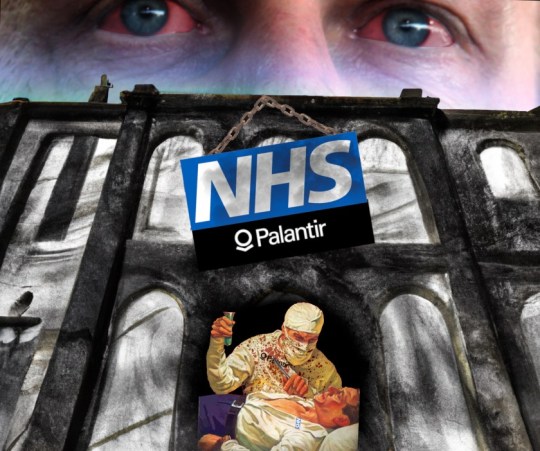
I'm on tour with my new, nationally bestselling novel The Bezzle! Catch me in TUCSON (Mar 9-10), then SAN FRANCISCO (Mar 13), Anaheim, and more!

Capitalism's Big Lie in four words: "There is no alternative." Looters use this lie for cover, insisting that they're hard-nosed grownups living in the reality of human nature, incentives, and facts (which don't care about your feelings).
The point of "there is no alternative" is to extinguish the innovative imagination. "There is no alternative" is really "stop trying to think of alternatives, dammit." But there are always alternatives, and the only reason to demand that they be excluded from consideration is that these alternatives are manifestly superior to the looter's supposed inevitability.
Right now, there's an attempt underway to loot the NHS, the UK's single most beloved institution. The NHS has been under sustained assault for decades – budget cuts, overt and stealth privatisation, etc. But one of its crown jewels has been stubbournly resistant to being auctioned off: patient data. Not that HMG hasn't repeatedly tried to flog patient data – it's just that the public won't stand for it:
https://www.theguardian.com/society/2023/nov/21/nhs-data-platform-may-be-undermined-by-lack-of-public-trust-warn-campaigners
Patients – quite reasonably – do not trust the private sector to handle their sensitive medical records.
Now, this presents a real conundrum, because NHS patient data, taken as a whole, holds untold medical insights. The UK is a large and diverse country and those records in aggregate can help researchers understand the efficacy of various medicines and other interventions. Leaving that data inert and unanalysed will cost lives: in the UK, and all over the world.
For years, the stock answer to "how do we do science on NHS records without violating patient privacy?" has been "just anonymise the data." The claim is that if you replace patient names with random numbers, you can release the data to research partners without compromising patient privacy, because no one will be able to turn those numbers back into names.
It would be great if this were true, but it isn't. In theory and in practice, it is surprisingly easy to "re-identify" individuals in anonymous data-sets. To take an obvious example: we know which two dates former PM Tony Blair was given a specific treatment for a cardiac emergency, because this happened while he was in office. We also know Blair's date of birth. Check any trove of NHS data that records a person who matches those three facts and you've found Tony Blair – and all the private data contained alongside those public facts is now in the public domain, forever.
Not everyone has Tony Blair's reidentification hooks, but everyone has data in some kind of database, and those databases are continually being breached, leaked or intentionally released. A breach from a taxi service like Addison-Lee or Uber, or from Transport for London, will reveal the journeys that immediately preceded each prescription at each clinic or hospital in an "anonymous" NHS dataset, which can then be cross-referenced to databases of home addresses and workplaces. In an eyeblink, millions of Britons' records of receiving treatment for STIs or cancer can be connected with named individuals – again, forever.
Re-identification attacks are now considered inevitable; security researchers have made a sport out of seeing how little additional information they need to re-identify individuals in anonymised data-sets. A surprising number of people in any large data-set can be re-identified based on a single characteristic in the data-set.
Given all this, anonymous NHS data releases should have been ruled out years ago. Instead, NHS records are to be handed over to the US military surveillance company Palantir, a notorious human-rights abuser and supplier to the world's most disgusting authoritarian regimes. Palantir – founded by the far-right Trump bagman Peter Thiel – takes its name from the evil wizard Sauron's all-seeing orb in Lord of the Rings ("Sauron, are we the baddies?"):
https://pluralistic.net/2022/10/01/the-palantir-will-see-you-now/#public-private-partnership
The argument for turning over Britons' most sensitive personal data to an offshore war-crimes company is "there is no alternative." The UK needs the medical insights in those NHS records, and this is the only way to get at them.
As with every instance of "there is no alternative," this turns out to be a lie. What's more, the alternative is vastly superior to this chumocratic sell-out, was Made in Britain, and is the envy of medical researchers the world 'round. That alternative is "trusted research environments." In a new article for the Good Law Project, I describe these nigh-miraculous tools for privacy-preserving, best-of-breed medical research:
https://goodlawproject.org/cory-doctorow-health-data-it-isnt-just-palantir-or-bust/
At the outset of the covid pandemic Oxford's Ben Goldacre and his colleagues set out to perform realtime analysis of the data flooding into NHS trusts up and down the country, in order to learn more about this new disease. To do so, they created Opensafely, an open-source database that was tied into each NHS trust's own patient record systems:
https://timharford.com/2022/07/how-to-save-more-lives-and-avoid-a-privacy-apocalypse/
Opensafely has its own database query language, built on SQL, but tailored to medical research. Researchers write programs in this language to extract aggregate data from each NHS trust's servers, posing medical questions of the data without ever directly touching it. These programs are published in advance on a git server, and are preflighted on synthetic NHS data on a test server. Once the program is approved, it is sent to the main Opensafely server, which then farms out parts of the query to each NHS trust, packages up the results, and publishes them to a public repository.
This is better than "the best of both worlds." This public scientific process, with peer review and disclosure built in, allows for frequent, complex analysis of NHS data without giving a single third party access to a a single patient record, ever. Opensafely was wildly successful: in just months, Opensafely collaborators published sixty blockbuster papers in Nature – science that shaped the world's response to the pandemic.
Opensafely was so successful that the Secretary of State for Health and Social Care commissioned a review of the programme with an eye to expanding it to serve as the nation's default way of conducting research on medical data:
https://www.gov.uk/government/publications/better-broader-safer-using-health-data-for-research-and-analysis/better-broader-safer-using-health-data-for-research-and-analysis
This approach is cheaper, safer, and more effective than handing hundreds of millions of pounds to Palantir and hoping they will manage the impossible: anonymising data well enough that it is never re-identified. Trusted Research Environments have been endorsed by national associations of doctors and researchers as the superior alternative to giving the NHS's data to Peter Thiel or any other sharp operator seeking a public contract.
As a lifelong privacy campaigner, I find this approach nothing short of inspiring. I would love for there to be a way for publishers and researchers to glean privacy-preserving insights from public library checkouts (such a system would prove an important counter to Amazon's proprietary god's-eye view of reading habits); or BBC podcasts or streaming video viewership.
You see, there is an alternative. We don't have to choose between science and privacy, or the public interest and private gain. There's always an alternative – if there wasn't, the other side wouldn't have to continuously repeat the lie that no alternative is possible.
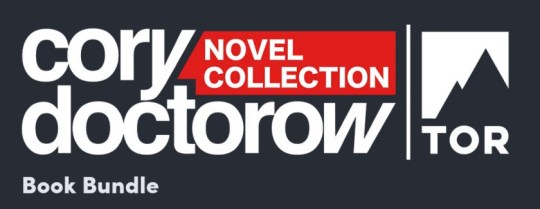
Name your price for 18 of my DRM-free ebooks and support the Electronic Frontier Foundation with the Humble Cory Doctorow Bundle.

If you'd like an essay-formatted version of this post to read or share, here's a link to it on pluralistic.net, my surveillance-free, ad-free, tracker-free blog:
https://pluralistic.net/2024/03/08/the-fire-of-orodruin/#are-we-the-baddies

Image: Gage Skidmore (modified) https://commons.m.wikimedia.org/wiki/File:Peter_Thiel_(51876933345).jpg
CC BY-SA 2.0 https://creativecommons.org/licenses/by-sa/2.0/deed.en
#pluralistic#peter thiel#trusted research environment#opensafely#medical data#floss#privacy#reidentification#anonymization#anonymisation#nhs#ukpoli#uk#ben goldacre#goldacre report#science#evidence-based medicine#goldacre review#interoperability#transparency
530 notes
·
View notes
Text


help from above
#find yourself a love that doesnt laugh when you're having the single worst day of your life#ace attorney#miles edgeworth#phoenix wright#narumitsu#ナルミツ#wrightworth#maya fey#ema skye#trust the science#artwork#aa by me#comics by me
306 notes
·
View notes
Text


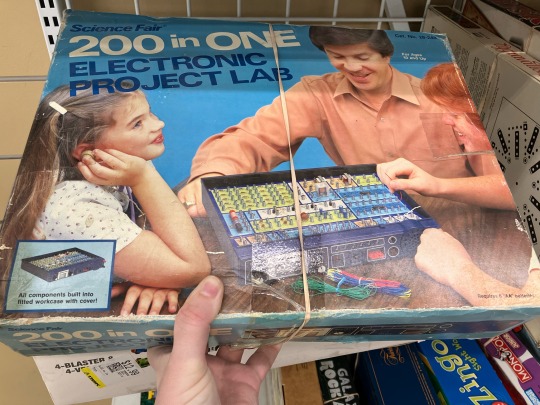







Recent-ish Admin BT finds: electronics edition (various thrifts in the Boise, ID area)
The Splash Dance shower radio was tempting just for the vibes, but I don't think any of the local radio stations are worthy of showering with me.
#seashells glued to shit#shit glued to sea shells#shower radio#old tvs#pharma merch#toaster#flip phone#clocks#irons#humidifier#idk i dont trust a secondhand humidifier#vintage science#the LG phone was $3#thrift#secondhand
137 notes
·
View notes
Text
im a scientist in the sense that i often fuck around and sometimes find out
#i usually make sure to have a bigger sample size than just once so i will keep fucking around and finding out and not learn anything#but it's for science trust me
2K notes
·
View notes
Text
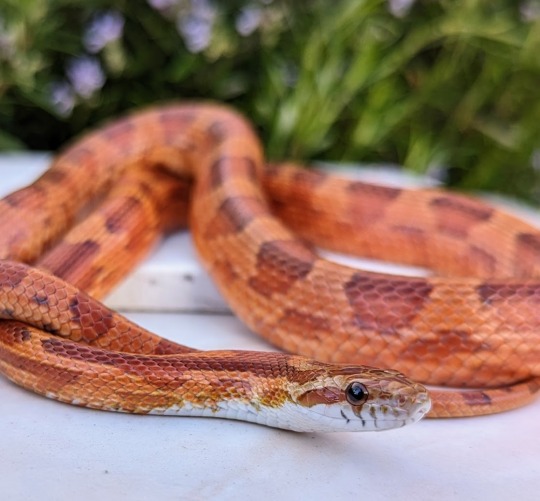
Peppercorn Bing Bong is a weird horse
#snake#snakes#reptile#reptiles#reptiblr#corn snake#corn snakes#corn snake morphs#peppercorn bing bong#peach corn snake#he doesn't like science!#Like he hates me#but he also loves and trusts me#but he's also very easily spooked#he just needs a lot of body autonomy#if I respect him and do things that show him he has control then he's awesome#he'll let me touch his face and he holds my wrist with his tail#he reaches for me if he's not sure about a situation#but if I do anything he deems dodgy I'll get a tail whip and a huff#also don't wake him up from a nap
339 notes
·
View notes